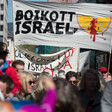Activism and BDS Beat 22 February 2016

Scarlett Johansson’s star power couldn’t save SodaStream from boycott pressure. (Gage Skidmore)
SodaStream, the maker of fizzy drink machines, has confirmed that pressure from an international boycott campaign prompted it to withdraw from the occupied West Bank.
In a recent interview with The Jerusalem Post, SodaStream’s CEO Daniel Birnbaum said that his firm had planned to eventually close its factory in Mishor Adumim, an industrial park adjoining an Israeli settlement in the West Bank.
The shutdown was accelerated by pressure from the Palestinian-led boycott, divestment and sanctions (BDS) movement, he confirmed.
“We didn’t leave Mishor Adumim because of BDS, we had a consolidation plan and we simply ran out of room for expansion there,” Birnbaum said. “However, if it wasn’t for BDS, we might have stayed there another year or two, so it did have some effect. So, you can say that BDS was responsible for 500 Palestinians losing their jobs when SodaStream moved.”
Birnbaum’s profession of concern for his former employees should be treated with skepticism.
Exploiting workers
Firms working in Israeli settlements have long been able to pay lower wages than those applying inside present-day Israel and to deny basic labor rights.
In 2013, The Electronic Intifada revealed how SodaStream’s Palestinian employees were routinely exploited. Workers who became ill tended to be fired after just one day of being absent, a member of staff stated.
Under Birnbaum, SodaStream actively promoted itself as a firm for which Palestinians were happy to work. Visits to the plant were arranged for Western journalists and videos presenting SodaStream in a positive light were posted on the Internet.
The Electronic Intifada revealed, however, that Palestinian workers chosen for SodaStream’s “public relations” campaigns were given strict instructions about what to say.
A 2014 report by +972 Magazine detailed the summary firings of employees working 12-hour shifts who complained of inadequate meals provided after long days of fasting during the holy month of Ramadan.
Nonetheless, Birnbaum’s remarks are significant in that he concedes that pressure from the BDS movement is affecting investment decisions by major companies.
Previously, a number of corporations – including Veolia, G4S, CRH and Orange – have ceased or pledged to cease operations in the West Bank. Yet none of them have explicitly stated that they were taking such actions because of the BDS movement.
A Human Rights Watch report published in January recommended that all businesses halt their involvement in Israel’s settlements in the West Bank. All such settlements are illegal under international law.
Super Bowl setback
“Settlement businesses unavoidably contribute to Israeli policies that dispossess and harshly discriminate against Palestinians, while profiting from Israel’s theft of Palestinian land and other resources,” Arvind Ganesan, a Human Rights Watch representative, said in a statement.
“The only way for businesses to comply with their own human rights responsibilities is to stop working with and in Israeli settlements,” Ganesan added.
SodaStream’s public image suffered serious setbacks following a 2014 Super Bowl commercial starring the Hollywood actress Scarlett Johansson.
The movie star’s paid endorsement of an Israeli settlement company brought an end to her role as a global ambassador with the anti-poverty group Oxfam, which runs aid and development programs in the West Bank and Gaza.
While Johansson defended SodaStream as a “a model for some sort of movement forward,” Oxfam maintained that “businesses, such as SodaStream, that operate in settlements further the ongoing poverty and denial of rights of the Palestinian communities that we work to support.”
Johansson’s star power plus one of the most-watched sports events in the world made headlines for the BDS movement like never before.
As The New York Times’ Robert Mackey wrote, the scandal was “a publicity bonanza for a Palestinian-led movement to counter Israel’s military dominance with a campaign of boycotts, divestment and sanctions.”
Later that year, SodaStream announced plans to close its West Bank factory and move its operations to the Naqab (Negev) region of present-day Israel. At the time, SodaStream claimed the move was for “purely commercial” reasons.
But after months of plummeting revenues and share prices, even business publications placed the move squarely in the context of BDS. “SodaStream closing West Bank factory targeted by Boycotts in ScarJo Split,” a Bloomberg headline stated.
Still a target
Although BDS activists declared victory when SodaStream announced its move from the West Bank, many in the movement say that the company should remain a target.
Last September, Mahmoud Nawajaa, general coordinator of the Palestinian BDS National Committee (BNC), argued that SodaStream remained implicated in the displacement of Palestinians. The new factory depends on labor from Rahat, a planned township for Palestinian Bedouins who have been forcibly displaced from their communities in the Naqab.
“SodaStream, as a beneficiary of this plan, is complicit with this violation of human rights,” said Nawajaa.
It should also be recalled that the BDS movement demands an end to the discrimination faced by Palestinian citizens of Israel. For that and other reasons, the boycott call applies to all Israeli firms and goods, not just to products from Israel’s settlements in the West Bank.





Comments
BDS works. There is power in
Permalink maggie replied on
BDS works. There is power in collective resistance. Boycott. Divest. Sanctions. Keep on keeping on with BDS. It will win in the end.
Brighton BDS
Permalink Tony Greenstein replied on
I think, with due modesty of course, that the campaign in Brighton to close the Sodastream shop, helped contribute a lot to the overall campaign.
For 2 years we experienced a determined Zionist counter-picket, the likes of which we had never seen. Their demonstrations were at times larger and they were at times violent, (whilst of course always claiming to be the victim). A number of people, including myself, were prosecuted for assaulting the said Zionists although all their accusations were lies.
One guy, a Palestinian, was accused of harrassing the lying Zionist Secretary of Sussex Friends of Israel, Fiona Sharpe. She accused the defendant of screaming 'nazi' etc. in her face. Unfortunately for her we had video footage of all the demonstrations (an important point for all such demonstrations) and we proved in court that she was a liar and a perjurer.
I was likewise prosecuted for defending myself and the prosecution eventually dropped charges.
It therefore came as a blow to the Zionists when the shop suddenly announced they were closing.
To be fair to the Zionists their counter-demonstrations helped because anyone with any sense avoided the shop altogether. On Saturday afternoons the quietest place in Brighton city centre was Sodastream's shop! The opportunists called it 'Ecostream' to take advantage of Brighton's eco friendly reputation (it has the only Green MP in Britain).
The local PSC's membership shot up as a result of the protests. It's now probably the biggest group in Britain with over 200 members. It was a hard struggle but it paid off.
That's one reason why the Zionists are now trying to make such protests illegal.
I wonder how compliant could
Permalink Hans Wust replied on
I wonder how compliant could have been the court with that perjurer for in most countries to lie in court files automatically a case.
God bless the BDS
Permalink BA replied on
Absolutely brilliant! BDS works again, one company at a time.
Soda Stream admits to bowing to boycott pressure
Permalink R Davis replied on
I am in Victoria, Australia & have nothing to do with the boycott.
My daughter has a Soda Stream - what a waste of money it was - it is an inferior product.
Soda water drinkers like soda water, to taste like soda water.
A bottle of Coles brand soda water only costs 90 Australian cents - add a good quality cordial such as Bickford's - I like cranberry flavor, but hey - & you have a nice tasting & refreshing soda drink.
If a product is no good - what can I tell you - !